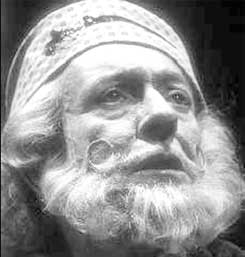|
|
 |
| |
If the whole world’s a stage, this is the atlas
It’s a shame that such a readable examination of the stage should be restricted to the world of actors, writes Chris Larkin
The Art of the Actor by Jean Benedetti Methuen, £17.99 order this book
A GREAT actor, my father, once told me a story about one of Stanislavski’s company of actors whom he was showing around the caverns of the National Theatre in the early 1970s.
My father, Robert Stephens, had been badgering this very old Russian actor to tell him about working with the great man.
Eventually, after plying him with fine foods and even more wine, the old actor told my father with a wink to “read all of Stanislavski’s books, ingest them, understand them, then take them to the end of a very long pier and throw them into the sea”.
Not that I would advocate throwing Jean Benedetti’s book The Art of the Actor into the sea – far from it.The Art of the Actor is a fine reference book and an articulate history and, I would suggest, it is required reading for any aspiring acting or drama student. I have to admit it exposed shameful gaps in my knowledge of my own craft.
Beneditti’s book tackles the history of the art of acting from the classical oratory of Cicero and Aristotle to modern times. Sections on the Poetics and the works of Qunitillus, who pretty much set down the basic rules of acting more than 1,000 years ago, proved fascinating. This history finishes up at the rehearsal notes from Brecht’s productions of The Life of Galilio and other plays, illustrating the exciting things which can occur in rehearsal, when different acting styles come together and work in harmony to create a piece with real depth and beauty.
He cites as examples Charles Laughton, from the English classical tradition, and Bertold Brecht, the German intellectual, working as actor and director and learning from each other.
In the second half of the book, Benedetti concentrates on modern theatre, especially the work of Stanislavski and Brecht, and this proves to be the most interesting.
These two giants of modern theatre, along with Chekov, prove to be Benedetti’s real metier.
The “system”, a particular style of acting, a term coined by Stanislavski is explained in simple terms along with useful exercises.
My only brush with the ‘system’, as a student at drama school proved to be a nightmare which still brings on cold sweats.
Benedetti has made me realise that I was just badly taught by an individual who preferred mind games to the pursuit of truth and excellence.The ‘system’ can bring out honesty and depth in a performance which a classically trained actor cannot match using his ‘technique’ alone.
This book proves an excellent introduction to the work and teachings of Stanislavski.
Although there are things in this book I do not agree with, such as some of the work of Diderot and indeed elements of Stanislavski, I reserve the right to reject some of the tenants Benedetti explains, because it simply does not work for me.
Of the premise that all knowledge is a good thing, it is important to be furnished with as much detail of different acting styles as possible, so that one can choose to disregard some of those ideas if they do not inspire.
We both seem to agree with a fundamental truism, that, in reality, all actors are like magpies.
We steal bits from here and there that we take a fancy to. As long as they work for us (and in turn the audience) it matters little whether we are ‘method’ or ‘classical’ actors.
In essence, every actor is their combination of systems. Benedetti’s book ably explains the history of where all these differing ideas on the mechanics of acting come from.
What is fascinating is that while reading this book, I kept thinking: as trends and attitudes and methods of acting evolved over the last 1,000 years in their Darwinian way, there was always one constant; the audience.
Whether we are watching Roscius, Coquelin, Garrick or Brando, the audience are always going to be at the receiving end of that craft Benedetti has so successfully documented.
His history is concise and never overly wordy or academic (except possibly in the final chapter in trying to explain the work of Artaud and Grotowisky).
Hard subject matter indeed but worth persevering with to the end. Although specialised and in essence a textbook that is always readable.
The highest praise I can give is that it now nestles on my bookshelf alongside my other actor’s ‘bibles’: Shakespeare’s Onions Glossary, Clifford Turner’s Voice and Speech in the Theatre and Cicely Berry’s Voice and the Actor.
The book explains, in essence, a happy marriage of the Classical and Modern theatre. I can only envy the students of Rose Brueford who have the opportunity to experience the benefit of Jean Benedetti’s lectures and ensuing debates and discussions which would complement this great book.
How long will the public have to wait until the BBC or Channel 4 seize the mantle and commission The Art of the Actor into a documentary series?
|
| |
|
|
 |
|


